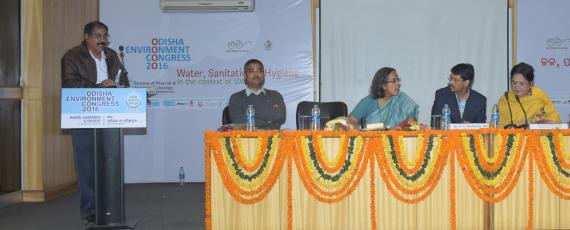LANSA session at Odisha Environment Congress 2016

The Odisha Environment Congress(OEC) is an annual event held in Bhubaneswar, the capital of Odisha state, in December every year. LANSA stakeholder engagement in Odisha led to contact with the organisers of the Congress in 2013. LANSA research was recognised and felicitated for advancing nutrition in India, by the organisers of the Congress in 2015 when the theme was “Environment, Health and Nutrition”. The Congress is organised in collaboration with the state government and sees the participation of a wide cross-section of stakeholders from government, academia and civil society. District-level pre-congress workshops and competitions for school children are organised across the state around the theme. A Children’s Environment Congress with participants from the districts is also a highlight every year.
The seventh edition of the Congress in 2016, had WASH in the Context of the SDGs as the focal theme. A series of sub-themes were identified for discussion. Given the importance of WASH for facilitating the agriculture-nutrition connect, we proposed “WASH and Agriculture-Nutrition Link” as one of the sub-themes for discussion. The two hour session was coordinated by LANSA and held on December 21, Dr P K Meherda, IAS, Commissioner cum Secretary, Department of Health & Family Welfare, Government of Odisha chaired the session and there were six speakers.
I made a presentation setting the context and presenting evidence from LANSA research in India on the importance of WASH for Agriculture to Impact on Nutrition. The chair, in his opening remarks, spoke of the importance of water for agriculture and for nutrition and called for the need for convergence between different departments of the government. He also emphasized the need for community participation and convergence in delivery of different schemes at the ground level.
The lead speaker Dr. Indira Chakravarty highlighted water quality, lack of access and or difficulty of access to safe drinking water sources and infections due to open defecation as some of the major causes for poor nutrition outcomes. She cited evidence from several studies to substantiate her points. Mr. Parhi, from UNICEF shared the example of an initiative being piloted with the government in the state of Bihar to promote nutrition gardens in schools and link them to the midday meal. WASH is an essential component of the package under this intervention. Dr. S K Ray pointed out the lack of nutrition focus in most agriculture policies and highlighted the importance of water quality, access and preventing wastage. Dr. Palo’s presentation was based on an ongoing study linking water quality with incidence of kidney disease. Mr. Samal highlighted the initiatives under the National Health Mission to address access to water and sanitation.
The session saw over a hundred people participating and was well received.








Add new comment